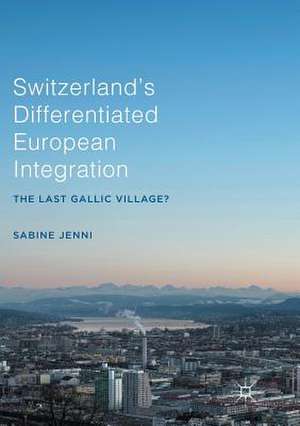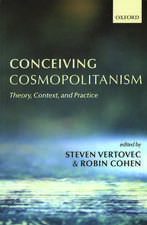Switzerland’s Differentiated European Integration: The Last Gallic Village?
Autor Sabine Jennien Limba Engleză Paperback – 7 iun 2018
| Toate formatele și edițiile | Preț | Express |
|---|---|---|
| Paperback (1) | 639.08 lei 6-8 săpt. | |
| Springer International Publishing – 7 iun 2018 | 639.08 lei 6-8 săpt. | |
| Hardback (1) | 643.48 lei 6-8 săpt. | |
| Springer International Publishing – 9 aug 2016 | 643.48 lei 6-8 săpt. |
Preț: 639.08 lei
Preț vechi: 751.86 lei
-15% Nou
Puncte Express: 959
Preț estimativ în valută:
122.30€ • 126.35$ • 101.79£
122.30€ • 126.35$ • 101.79£
Carte tipărită la comandă
Livrare economică 25 martie-08 aprilie
Preluare comenzi: 021 569.72.76
Specificații
ISBN-13: 9783319815725
ISBN-10: 3319815725
Pagini: 301
Ilustrații: XVI, 301 p. 13 illus.
Dimensiuni: 148 x 210 mm
Greutate: 0.38 kg
Ediția:Softcover reprint of the original 1st ed. 2016
Editura: Springer International Publishing
Colecția Palgrave Macmillan
Locul publicării:Cham, Switzerland
ISBN-10: 3319815725
Pagini: 301
Ilustrații: XVI, 301 p. 13 illus.
Dimensiuni: 148 x 210 mm
Greutate: 0.38 kg
Ediția:Softcover reprint of the original 1st ed. 2016
Editura: Springer International Publishing
Colecția Palgrave Macmillan
Locul publicării:Cham, Switzerland
Cuprins
1. Introduction.- 2. Measuring Switzerland’s differentiated integration.- 3. Institutional dynamics of Switzerland’s differentiated integration.- 4. Political dynamics of Switzerland’s differentiated integration.- 5. Conclusion.- Annex.
Notă biografică
SabineJenni is an Associated Researcher at ETH Zurich and holds teaching assignmentsat the University of Lucerne, Switzerland. She also works as a ProjectCoordinator for artasfoundation.
Textul de pe ultima copertă
‘While there has been much talk in both scientific andpolitical arenas, we still know little about the dynamics and day-to-dayfunctioning of Switzerland's "bilateral way". Jenni's excellent bookfills a gap. The innovative application of the "differentiatedintegration" framework to a rich collection of data makes an importantcontribution to both the Swiss and European literature.’
– Prof. Pascal Sciarini, Headof the Department of Political Science and International Relations,University of Geneva, Switzerland
‘The book addresses very topical and hithertounder-investigated questions on the basis of an impressive database. It makes amajor contribution to the existing literature both for conceptualizing thenotion of differentiated integration at the level of regulatory Europeanizationand for our knowledge of the scope and dynamism of European provisions in theSwiss legal order.’ – Prof. Sandra Lavenex, University of Geneva, Switzerland
‘Sabine Jenni provides a systematic long-term analysis ofthe impact of European integration on Swiss legislation. She finds that,although Switzerland is not an EU member, it is subject to the same orfunctionally equivalent institutional dynamics as the member states. This studymakes an important contribution to our understanding of differentiatedintegration – and a highly topical one in light of the ‘Brexit’ debate.’
– Prof. Frank Schimmelfennig, ETH Zurich, Switzerland
Thisbook analyses Switzerland’s European policies using the concept ofdifferentiated European integration, providing a new and original perspectiveon the country. This analytical approach focuses on the similarities betweenSwitzerland's EU policies and the integration of EU member states. The latterhave often been the focus of research as Switzerland is the last WesternEuropean country not to have become a member of the European Union (EU) or theEuropean Economic Area (EEA). The book claims that Switzerland’s position onthe European integration map is different in terms of degree from many EUmember states, but not different in kind. The cornerstone of the book is newempirical data quantitatively measuring Switzerland’s differentiatedintegration during the period 1990 – 2010. The data rely on the sectoralagreements Switzerland concluded with the EU and the voluntary incorporation ofEU law into domestic legislation. The book shows, among other findings, thatover time Swiss European policies have begun to resemble integration policiesand that the more they did so, the more dynamically they evolved.
SabineJenni is Associated Researcher at ETH Zurich and holds teaching assignmentsat the University of Lucerne, Switzerland. She also works as a ProjectCoordinator for artasfoundation.
– Prof. Pascal Sciarini, Headof the Department of Political Science and International Relations,University of Geneva, Switzerland
‘The book addresses very topical and hithertounder-investigated questions on the basis of an impressive database. It makes amajor contribution to the existing literature both for conceptualizing thenotion of differentiated integration at the level of regulatory Europeanizationand for our knowledge of the scope and dynamism of European provisions in theSwiss legal order.’ – Prof. Sandra Lavenex, University of Geneva, Switzerland
‘Sabine Jenni provides a systematic long-term analysis ofthe impact of European integration on Swiss legislation. She finds that,although Switzerland is not an EU member, it is subject to the same orfunctionally equivalent institutional dynamics as the member states. This studymakes an important contribution to our understanding of differentiatedintegration – and a highly topical one in light of the ‘Brexit’ debate.’
– Prof. Frank Schimmelfennig, ETH Zurich, Switzerland
Thisbook analyses Switzerland’s European policies using the concept ofdifferentiated European integration, providing a new and original perspectiveon the country. This analytical approach focuses on the similarities betweenSwitzerland's EU policies and the integration of EU member states. The latterhave often been the focus of research as Switzerland is the last WesternEuropean country not to have become a member of the European Union (EU) or theEuropean Economic Area (EEA). The book claims that Switzerland’s position onthe European integration map is different in terms of degree from many EUmember states, but not different in kind. The cornerstone of the book is newempirical data quantitatively measuring Switzerland’s differentiatedintegration during the period 1990 – 2010. The data rely on the sectoralagreements Switzerland concluded with the EU and the voluntary incorporation ofEU law into domestic legislation. The book shows, among other findings, thatover time Swiss European policies have begun to resemble integration policiesand that the more they did so, the more dynamically they evolved.
SabineJenni is Associated Researcher at ETH Zurich and holds teaching assignmentsat the University of Lucerne, Switzerland. She also works as a ProjectCoordinator for artasfoundation.
Caracteristici
Offers a new and original perspective on Switzerland’s European integration Presents empirical data that quantitatively measures Switzerland’s differentiated Analyses the relation of Swiss European policies to the broader social,political and economic developments taking place during the twenty years understudy












